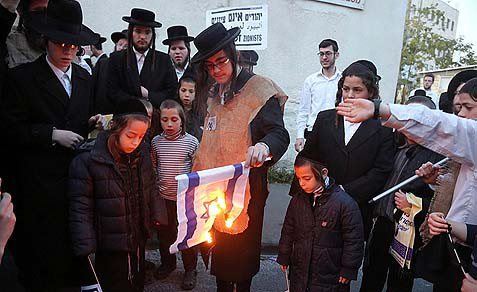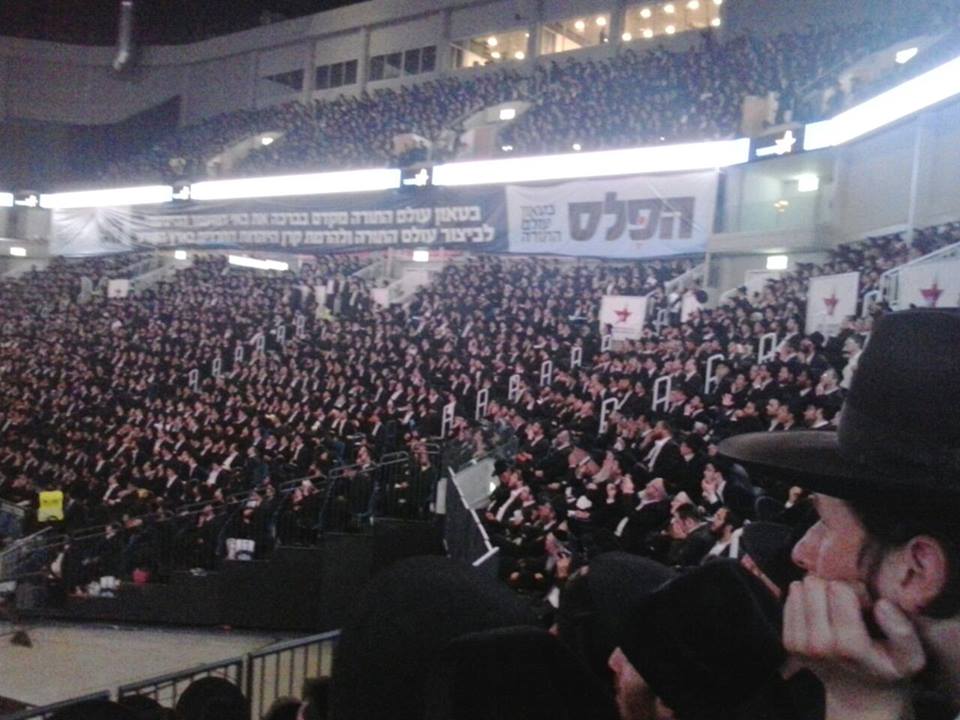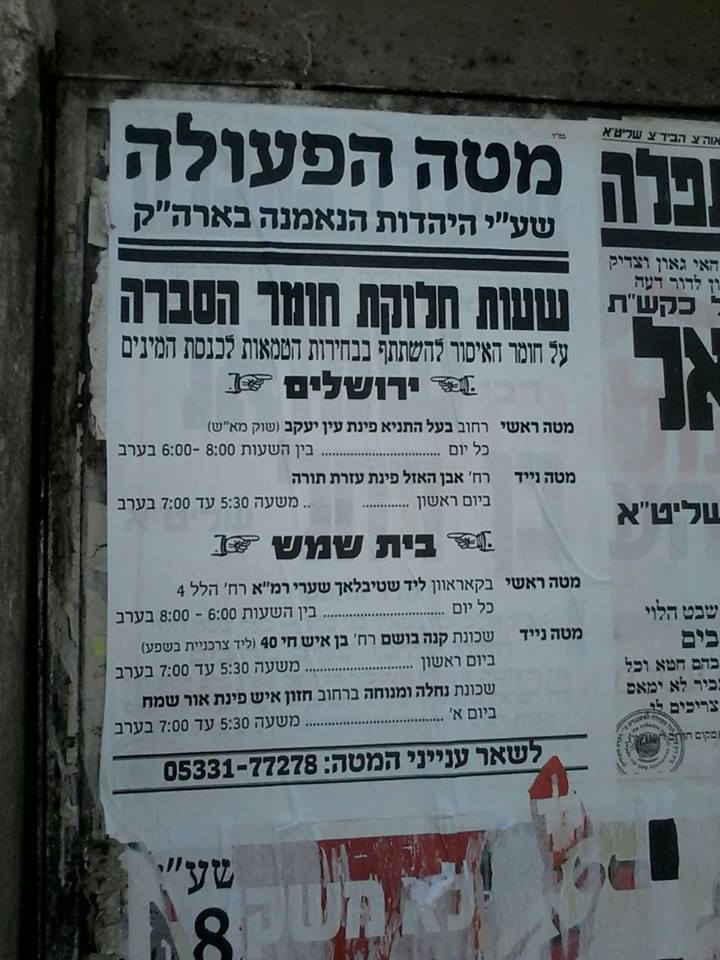
Why I boycott the Zionist elections
Where is democracy?
Wishers for peace, outsiders, or those who fail to understand both Israel’s current state and its history, and there are many of them, are somewhat excited about various polls that predict that Netanyahu’s Likud will be replaced by the Labour Party (the Zionist Camp) as the largest party in parliament. It bothers them little that Herzog and Livni defended Israel’s atrocities in Gaza, while Livni as a foreign minister carried them out in 2009, and that the two will present a progressive face to Israel’s occupation of the West Bank and blockade of Gaza while making it more difficult to criticise Israel, unlike while Netanyahu is in power. In their simplistic understanding in which a change in parliament also means a change in governance, they fail to understand the broader reality: that Israel’s occupation of the West Bank went on under both Labour and Likud, that Labour as a founder of the state was responsible for grave crimes not only against the Palestinians but also against European Jews who perished in the Holocaust and Mizrahi Jews who were heavily repressed in the new state, and that settlements only expanded during the era of Labour.
In other words, whereas while Netanyahu is in power it is clear that Israel is a state that keeps under its control millions of people who do not have the right to vote, Livni and Herzog will present a progressive face, while in the next clash with Gaza, thousands more will lose their lives. Israeli companies who profit immensely from the occupation, will continue to do so under both left or right governments. This is due to the fact that the immense Israeli security establishment dictates policy, rather than the government. The needs of the military industry are brought into account, while creating better health care and education for all citizens is not a priority. Israel will remain a vassal for the United States which will pursue its imperialist policy in the region using Israel to serve its purposes.
One may argue that the Labour in power would pave the way for a two state solution and peace will finally come to the region.
It appears to be indeed feasible that the US would like to have a two state solution as soon as possible, since protecting Israel diplomatically has been a heavy burden and it has come under increasing pressure from its European partners.
However, not only do a majority of Israelis believe there will be no peace under either government, but a two state solution forced by the US, would be unjust, as it would serve more to fend off pressure for the US, then to create a lasting and just solution to the conflict. Palestinians will be forced to accept living in bantustans, Jews would be forced to leave their homes in the West Bank, and the Zionist racist segregation based on ethnicity will continue. Palestinians are unlikely to have genuine independence or full access to the coastline of historical Palestine, under a two state solution forced by the Yankee Empire.
In addition, any attempt to force a two state solution which would entail the forced displacement of 500,000 settlers in the West Bank is likely to lead to a civil war and to chaos, while the prospect itself remains unimplementable.
In either scenario, then, a Labour government can be expected to continue the occupation while lifting the moral burden and shame off the shoulders of European governments who will happily trade with it freely while overlooking the ugly occupation in the West Bank. Alternately, a two state solution is unlikely, but if forced by the US would probably result in a Palestinian rejection (as it would probably not include East Jerusalem), in a civil war, or in the creation of a small enclave where Palestinians would be free to wander without checkpoints while being enclosed on all sides by Israel.
Yet, for the first time in the history of the state, a the Joint List, bringing together Arab Socialist, Communist, Islamist and nationalist forces, is running for parliament. It is expected to win somewhere between 13 and 15 seats, rendering it the third largest party in the country. Its charismatic leader, Ayman Odeh, not only has the sensitivity, knowledge and wisdom to reach out to a Jewish audience in a call for a common future on the same land and that Palestine/Israel is richer because it contains several cultures, but also can, hypothetically, form a broader coalition with the Mizrahi Jewish parrty Shas, under the leadership of Arye Deri and also with religious party Agudat Israel. With the former, he has in common the love for Arab culture and opposition to Ashkenazi hegemony, with the latter, opposition to forced conscription to the military and respect for the Yeshiva world.
This means that as a growing number of Israelis grows tired of the neoliberal-security state model offered by the Likud in its extreme version and by Labour in its softer version, and as Israelis listen to Ayman Odeh in the parliament and hear a Palestinian leader whose vision includes living in justice and peace with Jews on the same land, more and more marginalized groups may join an anti-Zionist, anti-neoliberal, anti-racist camp, which could include not only the Joint Party, but also Mizrahi, ultra-Orthodox and other parties.
Indeed, the secular Ashkenazi Zionist elite which has been ruling the country since its inception, no longer represents the majority of the population under its control, even within Israeli borders. And yet, the masks have not fallen off yet. People are still caught up in the security discourse, in the religious camp and in the Arab versus Jew world, that they are unable to see the broader picture and realize that in fact, marginalized groups can come together and live in solidarity once the elites are confronted and neutralized. Social issues have come up, and indeed The Zionist Camp (Labour) leaders Herzog and Livni, refused to accept difficult questions on Gaza and dismissed a Channel 4 reporter, preferring to say that they wish to focus on “social issues” but this only highlights how the occupation of Palestine can continue while these leaders present themselves as moderates.
Can the election of Odeh and the possibility of his forming a partnership with other anti-Zionist hegemony parties change this?
First, it is understandable that there is considerable excitement among Arab citizens of Israel regarding the Joint List. After Foreign Minister Lieberman proposed a law which raised the threshold, the Arab parties managed to unite into one bloc. Their vote is a protest vote but also a show of strength, signalling to Israeli leaders that they constitute 20% of the population of the country and deserve to be heard.
However, Odeh is unlikely to join a Zionist government and will probably be appointed as a leader of the opposition whether opposing the government or giving it his silent consent. Under the best possible scenario, he will become the chairman of the finance committee in the parliament and will correct decades long discrimination against Arab citizens of Israel and will invest in the Arab communities. This is important, since in the past 67 years since the inception of Israel, not a single new Arab city has been established by the state. However, the occupation of the West Bank will continue, millions of Palestinians will remain under a military occupation. In debates abroad, however, Israel will represent itself as a democracy, pointing to the fact that it has a large Arab party in the parliament.
Arab parties, therefore, serve as a fig leaf to Israel’s alleged democracy, while in practice Israel does everything in its power to minimize the number of non-Jews inside the country and to ensure a Zionist majority.
It is not my place to tell Arab citizens what to do. They believe they can achieve the best possible goal via voting for the parliament. I personally think they would be more effective if they would boycott the elections altogether, and form a broad anti-Zionist alliance with ultra-Orthodox Jews and Mizrahi Jews who oppose the Zionism regime, and seek to engage in a massive civil uprising along with a growing number of people who have been impoverished due to the state’s neoliberal policies. This, coupled by international isolation, would result in a crisis of legitimacy for the state. The future model for the region would be a federation which would allow for the existence of various communities living side by side with their right to autonomy respected. Such a future political arrangement will grant each community the respect and dignity it deserves, while not seeking to impose on the entire population a secular Zionist identity from 19th century Vienna.
However, the election of Odeh, is likely to present to Israelis a new face of the Palestinian spirit, in the form of a leader who adheres to a multicultural Palestine and has tremendous respect for Judaism. It also offers the possibility of forming such an anti-Zionist bloc against the government within the parliament in the future.
I am currently in Athens, and seriously considered going back to vote in order to strengthen the Join List. I also have a soft spot for Shas, a party that represented Mizrahi Jews who suffered under decades of discrimination (and although many of their voters are right-wing, they have the potential to form an alliance with Arabs parties if presented in the right language).
However, I decided against it. Mostly for practical reasons, but as time went by I felt more and more at peace about my decision. I cannot bring myself into a booth which means that I grant legitimacy to the Zionist state and recognize its parliament as a manifestation of democracy, not when millions of Palestinians suffer daily from a military occupation and when the so-called “State of Israel” is an enemy of Judaism and Jewish legacy.
Due to its very nature and framework, Israel is not designed to allow a change of the state’s nature within the parliament. Its laws and basic laws are designed to provide a strictly Zionist discriminatory policy while its policies ensure that a Zionist majority will always remain in the country.
Odeh can achieve some significant accomplishments in the Parliament, but that is the decision of Palestinian citizens of Israel and their Israeli supporters to take. Those Palestinian Israelis who wish to be discriminated against less, will vote for him. It is emotionally tempting to vote for him, and of course I hope to see him win. However, in the restraints offered by the state, he can offer only cosmetic changes while not changing the over-all conditions. The neoliberal oligarchy holding the reins is the one in charge, while the parliament serves as its cover.
When I place the pros versus the cons, it is clear to me that the act of granting legitimacy to the “State of Israel” is more powerful than any potential actions the Joint List may take.
Israel gains its legitimacy by the fact that its people vote for it and participate in its elections.
Voting in Israeli elections would mean that I grant legitimacy to the state that
-Occupies 4 million people in the West Bank in Gaza
-Mischievously presents itself as a State of the Jewish people, while its historical leaders dealt with the Nazis, even supported them (the Transfer Agreement,Ruppin, Kastner), and turned a blind eye to the extermination of non-Zionist Jews
-Lulled Mizrahi Jews to the Holy Land on flase promises while later placing them in inhumane conditions and robbing them of their spiritual and cultural heritage
-Seeks to forcibly conscript Torah-faithful Jews to the military so as to destroy any non-Zionist authentic expressions of Judaism
-Supports jihadists in Syria today while presenting itself as a democracy and a beacon of light against radicalism
If I would vote in the Israeli elections, Israel can then go on to carry actions in the name of its citizens, including, of course, bombing Gaza, forcibly conscripting religious Jews to the military and presenting itself as a democracy. I do not wish to give it the ability to speak in my name.
From the perspective of those who wish for justice for the Palestinians, the best possible solution would be a Netanyahu government. He is likely to continue to isolate Israel internationally and eventually will be forced to annex the West Bank and grant citizenship to Palestinian residents. Under such conditions, when the state is transformed into a genuine democracy and does not seek to impose its Zionist narrative on the populace, but grants it communities freedom to live as they wish, I can take part in the elections.
Nothing could be worse than a Zionist Camp government which presents itself as progressive while it is deeply racist. Indeed, Tzipi Livni said today on elections day that she is fearful Netanyahu will lead us into a binational state. That is another reason to hope for a Netanyahu victory. Even settlers and Israeli president Rubi Rivlin support a one state solution, but not the Israeli Left.
Yesterday, 13,000 religious Jews who represent the authentic Jewish tradition of studying Torah in the Yeshiva, decided to obey their leader, Rabbi Shmuel Ayerbach, and boycott the elections. This should not come as a surprise, Israel has been arresting students for failing to show up to military service and is attempting to forcibly conscript the ultra-Orthodox. They decided that it is better to disengage with the state, rather than collaborate with it. (Pictures in bottom of article).
That is the correct point of view. Indeed, one that liberals often fail to understand.
One of the things that I respect about those who practice strict adherents to the Torah is that they have the discipline to continue to practice every day the same method, even when one is tempted to get tired or lazy. When one goes through a storm, one may be tempted to give up temporarily and sit in a higher stone for a few minuets, only to be washed by a Tsunami shortly later. In order to take the right action, one must remain firm and not bend to temporary temptations which feel good. Dostoevsky taught us as much.
Arab citizens of Israel rightly vote to improve their conditions. I respect their decision. However, I personally do not wish to grant legitimacy to the Zionist state which claims it is a democracy and represents Jews worldwide. Judaism and Zionism are incompatible.
Rabbi Yoel Teitelbaum of Satmar, whose followers were betrayed by the Zionist collaborator with the Nazis, Rudolf Kastner, and who strongly opposed the Zionist state, said long ago that that Israel is an illegitimate entity and that it will collapse on its own due to the actions of its leaders. I am certain this will happen. Under Netanyahu it may happen faster, and that is why I hope he will form the next government.
In any case, to me it is clear that boycotting the Zionist elections is a stronger moral argument than participating in them.

Thousands of ultra-Orthodox Jews who will boycott the elections

A sign in the ultra-Orthodox neighborhood of Mea She’arim in Jerusalem calling against participating in the elections.